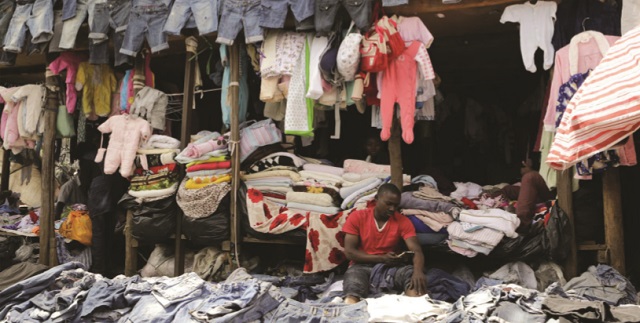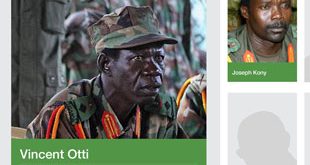
To stop relying on Western hand-me-downs, African countries are importing Chinese textile companies
Rwanda | LILY KUO | Every day the workers at C&H Garment Factory are required to learn a few words of Chinese. Today’s lesson, written on a whiteboard at the back of a humming factory floor, is the numbers 8, 9, and 10—written in Kinyarwanda, English, and Mandarin.
“We’re a Chinese company so we want to introduce a little Chinese culture to them,” the textile company’s owner, Candy Ma, says.
Like many workers in China, the staff are required to do group exercises before beginning their day. Signs with the words “diligence,” “quality,” and “responsibility,” written in English and Chinese, hang from the rafters. Chinese and Rwandan flags fly outside the glass-paneled building that houses C&H, which began operations last year in the Kigali Special Economic Zone on the outskirts of the capital.
Ma’s factory is the culmination of government efforts to establish a Rwandan textile industry and expand the country’s almost nonexistent manufacturing sector. For Rwanda, it’s also about moving on from being another third-world African country dressed in hand-me-downs donated from Western countries.
Ma has partnered with the Rwandan government to train locals in garment manufacturing, making clothing to sell locally as well as to export. One of the project’s goals, according to Rwanda’s minister of trade, is to stop relying on second-hand clothing and save the “struggling dignity” of the Rwandan people.
“It’s about being capable and self-reliant…wearing clothing that was owned by another person, is this dignity?” “It’s about being capable and self-reliant. We want to be independent… wearing clothing that was owned by another person, is this dignity? Can this make you proud?” Gerald Mukubu, head of Rwanda’s Private Sector Federation, which is part of the textile initiative, says.
Second-hand clothing in Rwanda, better known as chagua, or “to select” in Kiswahili, another language spoken in Rwanda, is sold in open air markets, shops, and by hawkers along the streets. Elsewhere, these clothes are known as “mitumba,” or “bundle,” referring to the plastic packages of donated clothing from wealthier countries that arrive in the region. More than 70% of clothes donated globally end up in Africa, according to the nonprofit Oxfam. Rwandans spend more than $100 million a year importing clothing, both second hand and new.
It’s not only worn by the country’s poorest; most middle class Rwandans wear a mix of new and recycled clothes. Mukubu says that while he doesn’t wear much second-hand clothing, many of his colleagues and friends do. Tharcisse Baranyeretse, a translator in Kigali, commented to Quartz that his entire outfit—a crisp button-up shirt, slacks, with a matching leather belt, and gleaming shoes—is all chagua. “Everyone wears it,” he says.
The East African Community (EAC), which includes Rwanda, Kenya, Uganda, Tanzania, and Burundi, as a whole has proposed a ban on second hand clothing by 2019. They hope the ban will help domestic textile manufacturers. Officials also claim that second-hand clothing is unsanitary and can lead to diseases. (There is little research that says second-hand clothing, if cleaned and stored properly, is unhygienic).
The campaign isn’t restricted to East Africa. South Africa has had a ban in place for decades. Ghana barred the sale of second-hand underwear in 2011. Malawi, and Zimbabwe have also been considering bans. Used clothing imports are also outlawed in the Philippines.
This is where industrialists like Ma come in. An energetic petite woman from Xi’an in central China, Ma moved to Rwanda in 2014 upon invitation from Mukubu’s Private Sector Federation. Before that she had set up shop in Ethiopia, one of the first African countries to become a base for Chinese textile manufacturing, where she first heard Rwanda was looking for investment. She also ran a mobile phone factory in Kenya.
Ma says she was attracted to the Rwandan government’s business friendly approach—taxes are low, she’s only required to pay income tax—the cleanliness of the capital city Kigali, and the people she encountered on a scoping mission. America’s recent renewal of the African Growth and Opportunity Act (AGOA), which gives African textile producers duty-free access to US markets for 15 years, has been another incentive.
“I have a lot of experience doing business in Africa and thought, ‘This could work,’” she says.
So far, C&H’s workforce of 800, which includes trainees and already trained workers, are making police uniforms, safety vests, and most recently military kit for the Rwandan security forces. C&H’s main product, uniforms, are mostly exported to Europe and the United States. They are branching out into underwear, which Ma plans to sell locally.
Ma’s remit is to help build a foundation for the industry. Technicians from Kenya, once home to a thriving textile scene, have been brought in to help teach the group how to sew, cut material, and inspect the production line. Ma is also holding a management course. A professional group, the Rwanda Association of Tailors has been set up to help promote the sector.
It won’t benefit us at all
It’s Kigali’s hope that more operations like Ma’s will come and eventually replace the need for the second-hand clothing market. But getting rid of chagua won’t be easy.
In the Biryogo Market, in the Muslim quarter of Kigali, there are hundreds of stalls with children’s clothes, nightgowns, and lingerie strewn across cheap wooden tables. The clothes here are from Canada, the Netherlands, the United States, and Europe. Stall owners estimate there are as many as 1,000 chagua sellers here.
“The way you can judge the quality is by the look and feel,” says a woman seated on a stool next to a stack of clothing still folded and packed in a plastic bag. She rifles through a pile and pulls out a striped polo, made with a thick heavy cotton, as demonstration.
Like many of the sellers here, she has been in this business for a long time—30 years of supporting five children through sales of chagua. When asked what she thinks of the government’s concern for the dignity of its people and hygiene issues of recycled clothing, she accuses the government of conspiracy.
“The government is lying, lying, lying. There’s something else behind it,” she says. She has heard about the proposed ban on television. “It won’t benefit us at all,” she says.
“Those clothes they want to sell us from the factories are made in China. They’re very fake, people don’t trust them.”
For many, used clothing is all they can afford. For others, shopping chagua is a way to curate their wardrobe and ensure they aren’t caught wearing the same thing as anyone else. At a recycled clothing shop in central Kigali, a smaller selection of clothes are on display, carefully hung in rows or folded into neat piles on a set of shelves. A young man in a denim shirt studded with rhinestones and paneled jeans scoffs at the idea of buying only new clothes. “The new clothes are like uniforms. It looks bad, like we are a sports team or a group of church singers.”
 The Independent Uganda: You get the Truth we Pay the Price
The Independent Uganda: You get the Truth we Pay the Price



There are a huge number of poor people that rely on second hand clothes as they cannot afford new clothes. That’s why I don’t think this should be banned in any country.